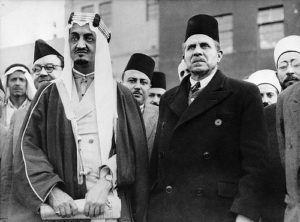 I have now ascertained from military observers in Damascus, Beirut and here that half of the (Arab) strength now concentrated in Palestine is capable of occupying the entire country within two weeks, provided that the politicians do not interfere in the military operations.
I have now ascertained from military observers in Damascus, Beirut and here that half of the (Arab) strength now concentrated in Palestine is capable of occupying the entire country within two weeks, provided that the politicians do not interfere in the military operations.
Our manpower in Palestine has attained far larger strength than at any time before.
1. Iraq has now 20,000 men.
2. Syria and Lebanon, 10,000.
3. The Palestinian irregulars number 10,000
4. But Transjordan has only 4,000 men.
5. The Liberation Army has 3,000. It was 6,000 strong, under el Kaukji. Now el Kaukji is on long furlough; the army was handed over to Aref Bey Shukeiri, the Lebanese.
Regarding our withdrawals in Palestine. It appears that only one person was killed during the withdrawals, which took place when the situation was still satisfactory. The withdrawals were carried out pursuant to an order emanating from Amman. The withdrawal from Nazareth was ordered by Amman; the withdrawal from Safed was ordered by Amman; the withdrawal orders from Lydda and Ramle are well known to you. During none of these withdrawals did fighting take place. The regular armies did not enable the inhabitants of the country to defend themselves, but merely facilitated their escape from Palestine.
All the orders emanated from one place. The Iraqian people were furious and sent a parliamentary delegation to study the situation in Palestine. Upon their return, the delegation declared that Palestine could be occupied by the Iraqian army in conjunction with the army of another Arab state. Consequently the feeling in the army reached a high tension. The Regent, Abdul-Illah, notified his uncle (King Abdullah) of the gloomy situation and that he (the Regent) contemplates a decisive deed, and emphasized the necessity of his uncle’s taking part in the operation. Thereupon Abdullah consented to the unification of both armies under the command of Iraq. Fortuantely el Pachachi happens to be Prime Minister. He is straightforward and good-hearted. He is now in the Lebanon and Syria to bring about the unification of their two armies.
Now everyone is convinced that the opportunity is ripe for the carrying out of large-scale operations in Palestine which, if launched last March, would have nullified Zionism; Zionism would now be defunct and an issue of the past. Anyhow, the illusion of the Jewish power no longer exists. Only the lack of arms in the hands of the Palestinians and the concentrations made by the Jews made us appear to be weak; this is a heart rendering state of affairs, especially when one bears in mind the misery which has befallen our people in Palestine.
The Arab League and its secretary (may he be cursed) have fettered the hands of those who are inactive, and have done much harm to Palestine. Hence the position of the Secretary-General is now critical; the Jewish morale is extremely bad, whereas our morale is strong, and everyone wishes to fight to the death rather than live in the present conditions.
Source- Kimche, Jon and David. Both Sides of the Hill- Britain and the Palestine War. London- Secker & Warburg, 1960, p. 233-234.